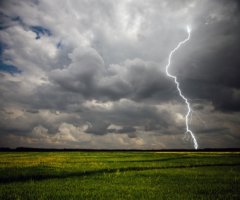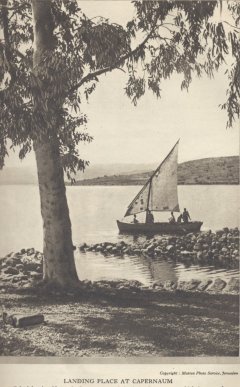This Article: (9 Pages)
- 1. John in the gospels
- 2. John's links to the Judean ruling... elite
- 3. The standard of learning in the... years C.E.
- 4. The beauty of John's letters
- 5. John, son of David and Aaron
- 6. John's letters
- 7. John's great issue – his... letters & The Great Lie
- 8. John himself
- 9. John's summary: The word made flesh
1) John in the gospels

From John's record, letters and the gospels, we learn he was no ordinary person. From John's own record we learn he was the first of the disciples with Andrew (Peter's brother), having previously been disciples of John the Baptist, and he was a follower from the very first.
Again the next day after John (the Baptist) stood, and two of his disciples; And looking upon Jesus as he walked, he saith, Behold the Lamb of God! And the two disciples heard him speak, and they followed Jesus. Then Jesus turned, and saw them following, and saith unto them, What seek ye? They said unto him, Rabbi, (which is to say, being interpreted, Master,) where dwell thou? (John 1:35-38)

Matthew and Mark agree that the two sets of brothers Peter and Andrew, James and John were called from their fishing and were first asked to follow Jesus (Matt 4:21 Mark 1:19 see Matt 10:2)
Of note is that Mark lists the Apostles with Simon first then skips Andrew in favour of James and John
And James the son of Zebedee, and John the brother of James; and he surnamed them Boanerges, which is, The sons of thunder: (Mark 3:17)
Which shows us that though John does not say as much as Simon Peter, he speaks with power, zeal and anger. In Greek he is surnamed thunder but Boanerges in Hebrew means literally “son of 'violent anger, rage'”. This characteristic must never be forgotten. This is how our Lord saw these men, and he knew their intent and their heart.

There is an incident that shows the two brother's characters as 'sons of anger',
And it came to pass, when the time was come that he (Jesus) should be received up, he stedfastly set his face to go to Jerusalem, And sent messengers before his face: and they went, and entered into a village of the Samaritans, to make ready for him. And they did not receive him, because his face was as though he would go to Jerusalem.
And when his disciples James and John saw this, they said, “Lord, will thou that we command fire to come down from heaven, and consume them, even as Elias (Elijah) did?”
But he turned, and rebuked them, and said, “Ye know not what manner of spirit ye are of. For the Son of man is not come to destroy men's lives, but to save them.”
And they went to another village. (Luke 9:51-56)
It is clear that these two men see black and white, and are zealous. Note they speak as “we” that is the pair of them would send fire together in Jesus' name. Jesus knew right from the beginning of his ministry that James and John were zealous, and men of controlled anger. They are consistent, but they are rebuked.
The three men, Peter, James and John are an inner circle with our Lord. They are sole witnesses of the resurrection of the daughter of the ruler of the Synagogue,
As soon as Jesus heard the word that was spoken, he said unto the ruler of the synagogue, “Be not afraid, only believe.” And he suffered no man to follow him, save Peter, and James, and John the brother of James. (Mark 5:36-37)
And when he is transfigured, though all the apostles were with him, he took only the three men,
And he said unto them, Verily I say unto you, That there be some of them that stand here, which shall not taste of death, till they have seen the kingdom of God come with power. And after six days Jesus takes with him Peter, and James, and John, and leads them up into an high mountain apart by themselves: and he was transfigured before them. (Mark 9:1-2, cp Luke 9:28)
And at his greatest hour of trial only the three, of all the disciples, went with him,
And they came to a place which was named Gethsemane: and he saith to his disciples, “Sit ye here, while I shall pray.” And he takes with him Peter and James and John, and began to be sore amazed, and to be very heavy; (Mark 14:32-33)
John is even more privileged, he is sent with Peter to prepare the last passover,
Then came the day of unleavened bread, when the passover must be killed. And he sent Peter and John, saying, “Go and prepare us the passover, that we may eat.”
And they said unto him, “Where do you desire that we prepare?” (Luke 22:7-9)
It is Peter and John who are sent by the apostles to Samaria after Philip preaches there (Acts 8:14)
John as a co- leader
James and John were seen as leaders, as they were not ordinary men. Their natural leadership of the group was occasionally under dispute. It is very revealing that after a dispute about leadership, it is John who speaks up,

And he (Jesus) came to Capernaum: and being in the house he asked them, “What was it that ye disputed among yourselves by the way?” But they held their peace: for by the way they had disputed among themselves, who should be the greatest.
And he sat down, and called the twelve, and saith unto them, “If any man desire to be first, the same shall be last of all, and servant of all.” And he took a child, and set him in the midst of them: and when he had taken him in his arms, he said unto them, Whosoever shall receive one of such children in my name, receives me: and whosoever shall receive me, receives not me, but him that sent me.
And John answered him, saying, “Master, we saw one casting out demons in thy name, and he follows not us: and we forbad him, because he follows not us.”
But Jesus said, “Forbid him not: for there is no man which shall do a miracle in my name, that can lightly speak evil of me. For he that is not against us is on our part.” (Mark 9:33-40 cp Luke 9:49)
We see John being strongly partisan, and very black and white. Either people are with the group or not. There is an assumption of an executive leadership of the apostles. We can know that it is John himself who directed this action. Jesus' reply is as black and white as John's, people are either with them or are not, but he corrects John's logic. It is intriguing as to who is the 'we' when John speaks. It gets more interesting in that James and John seek leadership together,
And they were in the way going up to Jerusalem; and Jesus went before them: and they were amazed; and as they followed, they were afraid. And he took again the twelve, and began to tell them what things should happen unto him, Saying, Behold, we go up to Jerusalem; and the Son of man shall be delivered unto the chief priests, and unto the scribes; and they shall condemn him to death, and shall deliver him to the Gentiles: And they shall mock him, and shall scourge him, and shall spit upon him, and shall kill him: and the third day he shall rise again.
And James and John, the sons of Zebedee, come unto him, saying, Master, we would that thou should do for us whatsoever we shall desire. And he said unto them, What would ye that I should do for you? They said unto him, Grant unto us that we may sit, one on thy right hand, and the other on thy left hand, in thy glory. But Jesus said unto them, Ye know not what ye ask: can ye drink of the cup that I drink of? and be baptized with the baptism that I am baptized with?
And they said unto him, We can.
And Jesus said unto them, Ye shall indeed drink of the cup that I drink of; and with the baptism that I am baptized withal shall ye be baptized: But to sit on my right hand and on my left hand is not mine to give; but it shall be given to them for whom it is prepared.
And when the ten heard it, they began to be much displeased with James and John. But Jesus called them to him, and saith unto them, Ye know that they which are accounted to rule over the Gentiles exercise lordship over them; and their great ones exercise authority upon them. (Mark 10:32-42)
James and John are rebuked, and shown their role....as servants.
But so shall it not be among you: but whosoever will be great among you, shall be your minister: And whosoever of you will be the chiefest, shall be servant of all. (Mark 10:43-44)
Matthew reports the same incident and adds it is their mother, who asks,
Then came to him the mother of Zebedee's children with her sons, worshipping him, and desiring a certain thing of him. And he said unto her, “What wilt thou?”
She saith unto him, “Grant that these my two sons may sit, the one on thy right hand, and the other on the left, in thy kingdom.” (Matthew 20:20-21)
James was indeed baptised with the baptism of Jesus as he is killed by Herod at the time of Passover, as his leader has been.
Now about that time (when the first Gentile convert was made in Cornelius) Herod the king stretched forth his hands to vex certain of the church. And he killed James the brother of John with the sword. And because he saw it pleased the Jews, he proceeded further to take Peter also. (Then were the days of unleavened bread.) (Acts 12:1-3)
John's use of 'we' & his zealous pro-active support of others
John rarely seems to take the lead, and tends to use the word “we”, as in the incident of commanding fire on the Samaritans (Luke 9:51-56), and casting out demons (Mark 9:33). He is a supporter. He stands close by the side of others, just as his mother had desired he sit at Jesus' side. After Jesus ascension it is Peter who takes the lead. Peter takes the lead in healing the lame man, and it is Peter who gives a defence of their actions,
And it came to pass on the morrow, that their rulers, and elders, and scribes, And Annas the high priest, and Caiaphas, and John, and Alexander, and as many as were of the kindred of the high priest, were gathered together at Jerusalem. And when they had set them in the midst, they asked, By what power, or by what name, have ye done this?
Then Peter, filled with the Holy Ghost, said unto them, “Ye rulers of the people, and elders of Israel, If we this day be examined of the good deed done to the impotent man, by what means he is made whole; Be it known unto you all, and to all the people of Israel, that by the name of Jesus Christ of Nazareth, whom ye crucified, whom God raised from the dead, even by him doth this man stand here before you whole. This is the stone which was set at nought of you builders, which is become the head of the corner. Neither is there salvation in any other: for there is none other name under heaven given among men, whereby we must be saved. Now when they saw the boldness of Peter and John, and perceived that they were unlearned and ignorant men, they marvelled; and they took knowledge of them, that they had been with Jesus. (Acts 4:5-13)
Now we have something quite odd here John never speaks, rather Peter does, and Annas and his kindred don't know Peter, but from another record we know they do know John! The fact that they don't know Peter means they know for a fact Peter is 'unlearned', or in other words, he was not a scribe in the Law. The word ignorant means a 'private person', or in other words, he is not a professional. They know also of John that he is not a scribe and has not been admitted to the elite schools of the city. For they know John, and the implication is that he wasn't before bold in their presence, and the leadership have discovered that John (who they knew) had been “with Jesus”. It might have been an unwelcome discovery.
There are many misconceptions of what Anti-Christ means due to mis-information, and sensationalism. It is not hard to confirm what the Bible actually says.

 Show All
Show All

